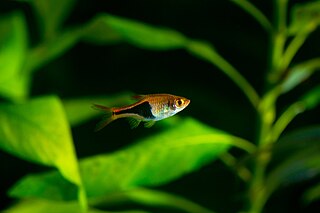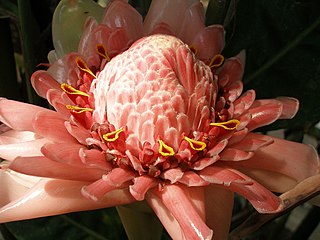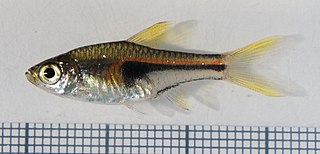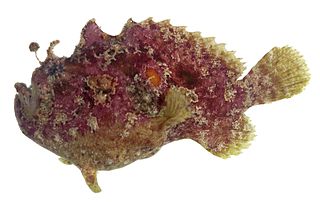
Rasbora is a genus of fish in the family Cyprinidae. They are native to freshwater habitats in South and Southeast Asia, as well as southeast China. A single species, R. gerlachi, is only known from an old specimen that reputedly originated from Africa (Cameroon), but this locality is considered doubtful. They are small, up to 17 cm (6.7 in) long, although most species do not surpass 10 cm (4 in) and many have a dark horizontal stripe.

The harlequin rasbora is a small fish in the family Cyprinidae. The species became an instant favorite among aquarists after its introduction in the early 1900s and is the best known and most widely kept species among the rasboras. In 1935, an image of a trio of harlequin rasboras, stamped in 14k gold, would grace the cover of the first edition of William T. Innes's classic Exotic Aquarium Fishes and would remain so through all 19 editions.

Trigonostigma is a genus of small cyprinid fish found in Southeast Asia. These social, colorful freshwater fish are often kept in aquariums.

Etlingera elatior is a species of herbaceous perennial plant in the family Zingiberaceae; it is native to Thailand, Malaysia and New Guinea.

Myctophum is a genus of lanternfishes, some species of which, such as M. punctatum are noted for having the Stylophthalmine trait in their larval form.

Betta is a large genus of small, active, often colorful, freshwater ray-finned fishes, in the gourami family (Osphronemidae). The best known Betta species is B. splendens, commonly known as the Siamese fighting fish and often kept as an aquarium pet.

The espei rasbora, or lambchop rasbora is a species of ray-finned fish in the genus Trigonostigma. It is named after the dark band that appears like a lamb chop along its body. The species is predominantly found in Thailand and Cambodia, with a population additionally known to occur on the island of Phú Quốc in Vietnam.

The glowlight rasbora is a species of cyprinid fish in the genus Trigonostigma.

Trigonostigma somphongsi is a species of ray-finned fish in the genus Trigonostigma. It is endemic to Thailand. It is threatened by habitat loss.

Piabucus is a genus of freshwater tetras in the family Iguanodectidae. All three species are found in South America, largely the Amazon and its major tributaries. None of them are longer than half a foot long, with the largest reaching a maximum size of 12.9 cm (5.1 in), and they are slender, with relatively deep chests and long pectoral fins. Their scales are pale or silvery, with lateral lines that stand out.

Callyspongia truncata is a species of marine sea sponge. Like all marine sponges, C. truncata is a member of phylum Porifera and is defined by its filter-feeding lifestyle and flagellated choanocytes, or collar cells, that allow for water movement and feeding. It is a species of demosponge and a member of Demospongiae, the largest class of sponges as well as the family Callyspongiidae. C. truncata is most well known for being the organism from which the polyketide Callystatin A was identified. Callystatin A is a polyketide natural product from the leptomycin family of antibiotics. It was first isolated in 1997 from this organism, which was collected from the Goto Islands in the Nagasaki Prefecture of Japan by the Kobayashi group. Recent studies have revealed numerous other bioactive compounds that have been found in this species.

Lethrinus atkinsoni is a species of emperor fish described by Alvin Seale in 1910. It is commonly 30 to 35 cm long with a bluish-grey, yellowish, or tan in colour, and a white belly. This species is widespread throughout the west Pacific Ocean. It is a reef-associated fish and is non-migratory. It is solitary or is found in small schools, and lives in seagrass beds and over the sandy bottoms feeding on plankton, mollusks, crustaceans, and other fishes. This fish is caught by humans for food, but less so than other species in the genus due to its small size.
Paul Georg Egmont Duncker was a German ichthyologist.
Dichelonyx truncata is a species of scarab beetle in the family Scarabaeidae. It is found in North America.
Leuctra truncata, the truncate needlefly, is a species of rolled-winged stonefly in the family Leuctridae. It is found in North America.

Antennatus coccineus, the scarlet or freckled frogfish, is a species of frogfish originally classified as Chironectes coccineus and Antennarius coccineus. It lives within tropical waters and has a central distribution being around Indo-East-Pacific areas- excluding Hawaii. The habitat of the scarlet frogfish is in the shallow zones of the ocean. It is found within reef areas, in rocky mounds or sponges where there are places for it to hide amongst from predators. The scarlet frogfish comes in a variety of colours, from tan and brown colours to bright reds and yellows and will grow to a maximum length of 13 centimetres (5.1 in). It can be identified taxonomically through its pectoral rays, the presence of dark patches that appear on its fins and body, along with its lack of distinctive tail base. The scarlet frogfish is not harmful to humans and is not caught by fisheries for consumption purposes, however it has been caught previously for studies relating to the abundance of reef-dwelling fish and as bycatch of shrimp trawling. Similar to other frogfish species, the scarlet frogfish is a predatory carnivore and exhibits a low degree of sociality, only interacting with other scarlet frogfish during their mating period.

DeLuxe Bar and Grill is a restaurant in Seattle's Capitol Hill neighborhood, in the United States.
Leucocoprinus truncatus is a species of mushroom-producing fungus in the family Agaricaceae.














